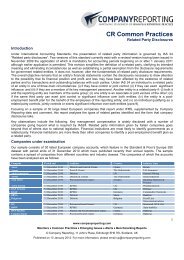AstraZeneca Annual Report and Form 20-F Information 2011
AstraZeneca Annual Report and Form 20-F Information 2011
AstraZeneca Annual Report and Form 20-F Information 2011
- No tags were found...
You also want an ePaper? Increase the reach of your titles
YUMPU automatically turns print PDFs into web optimized ePapers that Google loves.
Commercialisation <strong>and</strong> business execution risks continuedBiosimilarsVarious regulatory authorities are implementing or considering abbreviated approval processesfor biosimilars (similar versions of existing biologics, also referred to as ‘similar biologicalmedicinal products’, ‘follow-on biologics’ <strong>and</strong> ‘follow-on protein products’) that would competewith patented biologics.For example, in <strong>20</strong>10, the US enacted the Biologics Price Competition <strong>and</strong> Innovation Act withinthe Affordable Care Act, which contains general directives for biosimilar applications. The FDAsought stakeholder input on specific issues <strong>and</strong> challenges in implementing an abbreviatedbiosimilar approval pathway <strong>and</strong> further guidance is expected to be issued in the first quarterof <strong>20</strong>12. In addition, the FDA <strong>and</strong> the industry have reached agreement on biosimilar user fees.In Europe, the EMA published a draft guideline on similar biological medicinal productscontaining MAbs. This draft guideline will likely be finalised in <strong>20</strong>12 <strong>and</strong> is expected to includemore clarification around the definition of biosimilars.Increasing implementation <strong>and</strong> enforcement of more stringent anti-bribery<strong>and</strong> anti-corruption legislationThere is an increasing focus globally on the implementation <strong>and</strong> enforcement of anti-bribery <strong>and</strong>anti-corruption legislation. For example, the UK Bribery Act came into force in July. This act hasextensive extra-territorial application, implements significant changes to existing UK anti-briberylegislation <strong>and</strong> broadens the scope of statutory offences <strong>and</strong> the potential applicable penalties,including, organisational liability for any bribe paid by persons or entities associated with anorganisation where the organisation failed to have adequate preventative procedures in placeat the time of the offence. There is also an increase in the maximum applicable penalties forbribery, including up to 10 years imprisonment <strong>and</strong> unlimited fines. There have also beenincreased enforcement efforts in the UK by the Serious Fraud Office <strong>and</strong>, in the US, there hasbeen significant enforcement activity in respect of the Foreign Corrupt Practices Act by the SEC<strong>and</strong> US Department of Justice against US companies <strong>and</strong> non-US companies listed in the US.We are the subject of current anti-corruption investigations <strong>and</strong> there can be no assurancethat we will not, from time to time, continue to be subject to informal inquiries <strong>and</strong> formalinvestigations from governmental agencies. In the context of our business, governmentalofficials interact with us in a variety of roles that are important to our operations, such as in thecapacity of a regulator, partner or healthcare payer, reimburser or prescriber, among others.ImpactWhile it is uncertain when any such abbreviatedapproval processes may be fully adopted,particularly for more complex protein moleculessuch as MAbs, any such processes could materiallyadversely affect the future commercial prospectsfor patented biologics, such as the ones thatwe produce.ImpactWe devote significant resources to the considerablechallenge of compliance with this legislation,including in emerging <strong>and</strong> developing markets, atconsiderable cost. Investigations from governmentalagencies require additional resources. Despitetaking significant measures to prevent breachesof applicable anti-bribery <strong>and</strong> anti-corruption lawsby our personnel, breaches may result in theimposition of significant penalties, such as fines,the requirement to comply with monitoring orself-reporting obligations or debarment or exclusionfrom government sales or reimbursementprogrammes, any of which could materiallyadversely affect our financial condition <strong>and</strong> resultsof operations <strong>and</strong> reputation.Any expected gains from productivity initiatives are uncertainWe continue to implement various productivity initiatives <strong>and</strong> restructuring programmes with theaim of enhancing the long-term efficiency of the business. However, anticipated cost savings<strong>and</strong> other benefits from these programmes are based on estimates <strong>and</strong> the actual savings mayvary significantly. In particular, these cost reduction measures are based on current conditions<strong>and</strong> do not take into account any future changes to the pharmaceutical industry or ouroperations, including new business developments, wage or price increases.Failure of information technologyWe are dependent on effective IT systems. These systems support key business functions suchas our R&D, manufacturing <strong>and</strong> sales capabilities, <strong>and</strong> are an important means of internal <strong>and</strong>external communication.Failure of outsourcingWe have outsourced a number of business critical operations to third party providers.This includes certain R&D processes, IS/IT systems, human resources, finance <strong>and</strong>accounting services.In <strong>20</strong>11, we terminated our existing outsource relationship for IT infrastructure services <strong>and</strong>transitioned to a new multi-sourced operating model. This includes bringing critical strategic<strong>and</strong> control activities back into <strong>AstraZeneca</strong>.ImpactIf inappropriately managed, the expected value ofthese initiatives could be lost through low employeeengagement <strong>and</strong> reduced productivity, increasedabsence <strong>and</strong> attrition levels, <strong>and</strong> industrial action.Our failure to successfully implement these plannedcost reduction measures, either through thesuccessful conclusion of employee relationsprocesses (including consultation, engagement,talent management, recruitment <strong>and</strong> retention), orthe possibility that these efforts do not generate thelevel of cost savings we anticipate, could materiallyadversely affect our results of operations <strong>and</strong>financial condition.ImpactAny significant disruption of these IT systems orfailure to integrate new <strong>and</strong> existing IT systems couldmaterially adversely affect our financial condition<strong>and</strong> results of operations.ImpactFailure of the outsource provider to deliver timelyservices <strong>and</strong> to the required level of quality couldmaterially adversely affect our financial condition<strong>and</strong> results of operations <strong>and</strong> adversely impact ourability to meet business targets <strong>and</strong> maintain a goodreputation within the industry <strong>and</strong> with stakeholders.It may also result in non-compliance with applicablelaws <strong>and</strong> regulations.A failure to successfully manage <strong>and</strong> effect thetransfer of the provision of the IT infrastructureservices in-house <strong>and</strong> to the new outsourcingproviders could create disruption which couldmaterially adversely affect our financial condition<strong>and</strong> results of operations.Corporate Governance<strong>AstraZeneca</strong> <strong>Annual</strong> <strong>Report</strong> <strong>and</strong> <strong>Form</strong> <strong>20</strong>-F <strong>Information</strong> <strong>20</strong>11Risk 135










